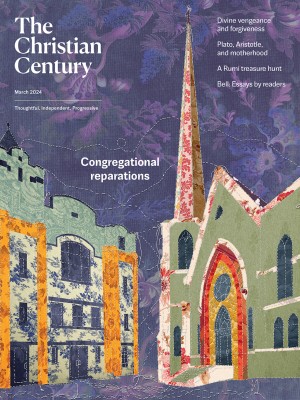March 3, Lent 3B (John 2:13–22)
Whatever Jesus is attacking, it isn’t the practices of the people coming to the temple to worship.
Each year the church I serve hosts part of our town’s holiday block party. One of the events is a gingerbread house contest run by a local nonprofit. Our vestry room is filled with visitors who cast their votes for the best houses, which are then auctioned off. It is always a packed event, filled with holiday cheer.
Last year the event was sponsored by a local bank. The nonprofit, eager to thank its sponsor, attached a large banner featuring the bank’s name to the front of the church building. It was there for several hours before I saw it, and when I did, the only thing I could think about was this week’s gospel story: Jesus chasing the money changers out of the temple. I could just picture him turning over all those gingerbread-covered tables in a fury.
Read our latest issue or browse back issues.
We sometimes take comfort in this passage. Jesus, holy and mild, was also at times angry. Rageful, even. If Jesus can throw a fit in the temple, of all places, surely we can also lash out. This passage might seem like a permission slip for righteous indignation.
I get that. When we hear calls to burn it all down from those who believe that things are broken beyond repair, it can be easy to empathize. That is especially true when we suspect people are being exploited, as may have been happening here. The money changers took the different currencies of the people who journeyed to Jerusalem, and the merchants offered the animals that would be sacrificed to God. A virtual mini mall had been set up in God’s house, and the ones doing the selling seem to have been at least as concerned with profits as they were with proper religious practice.
Jesus does not attack the practices of the people coming to the temple to worship but rather a particular system that has arisen around those practices. He does not condemn the temple itself, either. In fact, he holds it in such high regard that he seeks to purify it by expelling the mechanisms of financial exploitation. In a very real way, Jesus is saying, “Not in my father’s house.” As the scripture says, “Zeal for your house will consume” the one who comes in God’s name.
In the season of Lent, which too often has spurred Christian antisemitism, and especially in this time of increased antisemitism around the world, care must be taken with this passage. When the gospel refers to “the Jews,” we must be pastorally aware of how that sounds in today’s context. The Jewish people who went to the temple did so out of the desire to show God their reverence and to give of what they had. They are the ones Jesus aims to protect with his actions in this story.
At the same time, the people in the temple are baffled by what Jesus does—as any of us would be. They ask him why he kicked out the money changers and animal sellers. They have probably come a long way, and now Jesus has essentially just closed down the stores that have everything they need to make their journey worth it. I would have questions too.
Jesus answers, cryptically, that if the temple is destroyed, it will be raised in three days’ time. The people, who know the temple has been being rebuilt for decades, think Jesus is out of his mind. But Jesus is talking about the temple that is his body, which he knows is about to be destroyed—by another cruel and exploitative system that has nothing to do with the good and holy Jewish people who are asking him what in the world he is doing.
The ones Jesus most wants to remember this moment are neither the vendors nor the worshipers but his own friends, who still do not quite understand who Jesus is or what is going to happen. The disciples will look back after Jesus’ resurrection and understand his real meaning. What is ultimately destroyed is death itself. With the resurrection, the slow process of destroying the mechanisms of death will begin.
We took the banner down from the front of the church. The bankers were very understanding. I explained that we could not advertise any for-profit business on church grounds, and they assured me they agreed. Meanwhile, out in front of the church, a local farmer let her baby sheep and goats loose for the live nativity scene. No tables were flipped that day. The people came and went all night, and one of many of God’s houses was a place of true, mutual community.






